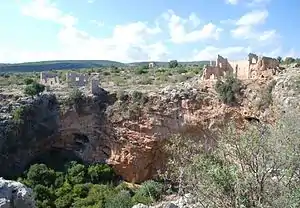Kanlıdivane
Kanlıdivane (ancient Canytelis, Greek: Κανυτελής) is an ancient city situated around a big sinkhole in Mersin Province, Turkey.

Geography
Kanlıdivane is in the rural area of Erdemli district, which is a part of Mersin Province at 36°31′32″N 34°10′45″E. It is 18 km (11 mi) to Erdemli and 55 km (34 mi) to Mersin. Its altitude is approximately 230 m (750 ft). It is close to the town Kumkuyu at the coast and just few hundred meters to Çanakçı rock tombs.
The sinkhole is quite wide; the longer dimension being 130 m (430 ft). The depth is about 70 m (230 ft)
History
There are ruins of antiquity around the sinkhole. They were unearthed and surveyed by Victor Langlois and Semavi Eyice.
Pre Roman era
Kanlıdivane was a part of the Olba Kingdom in the ancient age. In the northern necropolis, there is a mausoleum, which was built by the Queen Aba for her husband and sons. On the inscription of the tower at south-west it reads; "Built by Teukros, the son of priest king Tarkyaris of Olba for Zeus."
Roman era
By the first century, Olba kingdom became a vassal of the Roman Empire. Byzantine Emperor Theodosius II rebuilt the city as a Christian religious center and renamed it Neapolis.[1] There are ruins of basilicas, cisterns, rock cut graves etc. around the sinkhole.[2]
Kanlıdivane in popular culture
The current Turkish name Kanlıdivane may be a corrupt form of the ancient name Canytelis. It means "bloody crazy". It may refer to the red color of the surrounding soil. The name may also refer to a dreadful legend according to which the criminals had been executed by throwing into the sinkhole during Roman times.[3]
Kanlıdivane in Mersin Music Festival
Every year during Mersin International Music Festival, one or two outdoor concerts are held in Kanlıdivane. The audiences and performers sit at the opposite sides of the sinkhole. (During such concerts Metropolitan municipality of Mersin add free bus trips to Kanlıdivane.)
See also
References
| Wikimedia Commons has media related to Kanlıdivane. |
- Edwards, Robert W., "Kanlidivane" (2016). The Eerdmans Encyclopedia of Early Christian Art and Archaeology, ed., Paul Corby Finney. Grand Rapids, Michigan: William B. Eerdmans Publishing. pp. 2–3. ISBN 978-0-8028-9017-7.
- "Festival page {{in lang|tr}}". Archived from the original on 2010-05-05. Retrieved 2010-05-31.
- Travel guide